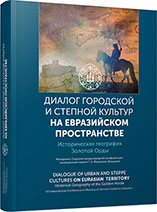Animals for Food in the Golden Horde City of Old Orhei (Republic of Moldova): Topography and Archaeozoological Data
Animals for Food in the Golden Horde City of Old Orhei (Republic of Moldova): Topography and Archaeozoological Data
Author(s): Luminiţa Bejenaru, Ludmila Bacumenco-Pîrnău
Subject(s): History, Archaeology, 13th to 14th Centuries, 15th Century, 16th Century, 17th Century
Published by: Издательский дом Stratum, Университет «Высшая антропологическая школа»
Keywords: Golden Horde; Old Orhei; food; archaeozoological data; topography
Summary/Abstract: The archaeological level of the Golden Horde period is analyzed, and this assemblage is compared to the level of the 15th—17th centuries in order to account for a diachronical variability of food resources of animal origin on the Old Orhei site.The study of medieval Old Orhei is mainly focused on the diversity of food resources as reflected by the archaeozoological analysis. Previous archaeozoological studies on the medieval period in Old Orhei discussed aspects related to animal species identified on the site and the proportion of wild and domestic species. The consumers of animal products especially differed by their ethnic belonging. Thus, in the period of Mongol (the Golden Horde) occupation, the main domestic species used in alimentation were the sheep/goat (Ovis aries/Capra hircus), the cattle (Bos taurus) and the horse (Equus caballus), while later — after Mongol retreat, the livestock of the local economy was mainly represented by the cattle (Bos taurus) and the pig (Sus domesticus).The hunting records a very low rate (0.24% NISP) during the Golden Horde period; the low occurrence frequency of wild animals’ remains in this cultural level is quite surprising, since the documents of the time contain information emphasizing that the Mongols used to greatly rely on hunting, which was practiced for different purposes: to compensate a food shortage, to secure furs and hides, to keep fit for future battles, etc.
Book: Диалог городской и степной культур на Евразийском пространстве. Историческая география Золотой Орды
- Page Range: 259-262
- Page Count: 4
- Publication Year: 2016
- Language: English
- Content File-PDF

